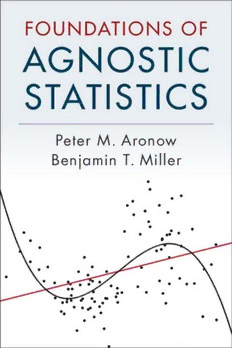
Foundations of agnostic statistics PDF
Preview Foundations of agnostic statistics
FoundationsofAgnosticStatistics Reflecting a sea change in how empirical research has been conducted over thepastthreedecades,FoundationsofAgnosticStatisticspresentsaninnova- tivetreatmentofmodernstatisticaltheoryforthesocialandhealthsciences. This book develops the fundamentals of what the authors call agnostic statistics, which considers what can be learned about the world without assuming that there exists a simple generative model that can be known to betrue.AronowandMillerprovidethefoundationsforstatisticalinference for researchers unwilling to make assumptions beyond what they or their audiencewouldfindcredible.Buildingfromfirstprinciples,thebookcovers topics including estimation theory, regression, maximum likelihood, miss- ingdata,andcausalinference.Usingtheseprinciples,readerswillbeableto formally articulate their targets of inquiry, distinguish substantive assump- tions from statistical assumptions, and ultimately engage in cutting-edge quantitativeempiricalresearchthatcontributestohumanknowledge. PeterM.AronowisanassociateprofessorofPoliticalScience,PublicHealth (Biostatistics), and Statistics and Data Science at Yale University and is affiliatedwiththeuniversity’sInstitutionforSocialandPolicyStudies,Cen- ter for the Study of American Politics, Institute for Network Science, and OperationsResearchDoctoralProgram. Benjamin T. Miller is a doctoral candidate in Political Science at Yale Uni- versity.Mr.MillerholdsaBAinEconomicsandMathematicsfromAmherst College(2012). Foundations of Agnostic Statistics PETER M. ARONOW YaleUniversity BENJAMIN T. MILLER YaleUniversity UniversityPrintingHouse,CambridgeCB28BS,UnitedKingdom OneLibertyPlaza,20thFloor,NewYork,NY10006,USA 477WilliamstownRoad,PortMelbourne,VIC3207,Australia 314–321,3rdFloor,Plot3,SplendorForum,JasolaDistrictCentre,NewDelhi–110025,India 79AnsonRoad,#06-04/06,Singapore079906 CambridgeUniversityPressispartoftheUniversityofCambridge. ItfurtherstheUniversity’smissionbydisseminatingknowledgeinthepursuitof education,learning,andresearchatthehighestinternationallevelsofexcellence. www.cambridge.org Informationonthistitle:www.cambridge.org/9781107178915 DOI:10.1017/9781316831762 (cid:2)c PeterM.AronowandBenjaminT.Miller2019 Thispublicationisincopyright.Subjecttostatutoryexception andtotheprovisionsofrelevantcollectivelicensingagreements, noreproductionofanypartmaytakeplacewithoutthewritten permissionofCambridgeUniversityPress. Firstpublished2019 PrintedandboundinGreatBritainbyClaysLtd,ElcografS.p.A. AcataloguerecordforthispublicationisavailablefromtheBritishLibrary. LibraryofCongressCataloging-in-PublicationData Names:Aronow,PeterM.,author.|Miller,BenjaminT.,author. Title:Foundationsofagnosticstatistics/PeterM.Aronow,BenjaminT.Miller. Description:NewYork:CambridgeUniversityPress,2019. Identifiers:LCCN2018039877|ISBN9781107178915(hardback)| ISBN9781316631140(paperback) Subjects:LCSH:Quantitativeresearch.|Statistics.| BISAC:POLITICALSCIENCE/General. Classification:LCCQA76.9.Q36A762019| DDC001.4/2–dc23LCrecordavailableathttps://lccn.loc.gov/2018039877 ISBN978-1-107-17891-5Hardback ISBN978-1-316-63114-0Paperback CambridgeUniversityPresshasnoresponsibilityforthepersistenceoraccuracyof URLsforexternalorthird-partyInternetWebsitesreferredtointhispublication anddoesnotguaranteethatanycontentonsuchWebsitesis,orwillremain, accurateorappropriate. For Our Parents Idonotpretendtoknowwheremanyignorantmenaresure—that isallthatagnosticismmeans. —ClarenceDarrow Contents ListofTablesandFigures pagexii Introduction xv PARTI PROBABILITY 1 1 ProbabilityTheory 3 1.1 RandomEvents 4 1.1.1 WhatIsProbability? 4 1.1.2 FundamentalsofProbabilityTheory 5 1.1.3 JointandConditionalProbabilities 9 1.1.4 IndependenceofEvents 14 1.2 RandomVariables 15 1.2.1 WhatIsaRandomVariable? 16 1.2.2 DiscreteRandomVariables 18 1.2.3 CumulativeDistributionFunctions 21 1.2.4 ContinuousRandomVariables 24 1.2.5 Support 30 1.3 BivariateRelationships 31 1.3.1 DiscreteBivariateDistributions 32 1.3.2 DiscreteMarginalandConditionalDistributions 33 1.3.3 JointlyContinuousRandomVariables 36 1.3.4 IndependenceofRandomVariables 38 1.4 MultivariateGeneralizations 39 1.5 FurtherReadings 43 vii viii Contents 2 SummarizingDistributions 44 2.1 SummaryFeaturesofRandomVariables 45 2.1.1 ExpectedValues 45 2.1.2 Moments,Variances,andStandardDeviations 50 2.1.3 MeanSquaredError 56 2.2 SummaryFeaturesofJointDistributions 59 2.2.1 CovarianceandCorrelation 59 2.2.2 Covariance,Correlation,andIndependence 64 2.2.3 ConditionalExpectationsandConditionalExpectation Functions 67 2.2.4 BestPredictorsandBestLinearPredictors 75 2.2.5 CEFsandBLPsunderIndependence 82 2.3 MultivariateGeneralizations 84 2.4 FurtherReadings 88 PARTII STATISTICS 89 3 LearningfromRandomSamples 91 3.1 I.I.D.RandomVariables 91 3.1.1 RandomSampling 92 3.1.2 I.I.D.asApproximation 94 3.2 Estimation 96 3.2.1 SampleMeans 96 3.2.2 EstimationTheory 102 3.2.3 VarianceEstimators 105 3.2.4 TheCentralLimitTheoremforSampleMeans 108 3.2.5 AsymptoticEstimationTheory 111 3.2.6 EstimatingStandardErrorsofSampleMeans 114 3.3 ThePlug-InPrinciple 116 3.3.1 TheUsualPlug-InRegularityConditions 120 3.3.2 KernelEstimation 121 3.4 Inference 124 3.4.1 ConfidenceIntervals 124 3.4.2 HypothesisTesting 128 3.4.3 TheBootstrap 130 3.4.4 Micronumerosity 132 3.5 ClusterSamples 135
